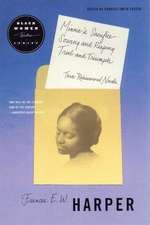Heretic's Heart: A Journey Through Spirit & Revolution
Autor Margot Adleren Limba Engleză Paperback – 31 aug 1997
Preț: 166.25 lei
Nou
Puncte Express: 249
Preț estimativ în valută:
31.82€ • 34.58$ • 26.75£
31.82€ • 34.58$ • 26.75£
Carte tipărită la comandă
Livrare economică 21 aprilie-05 mai
Preluare comenzi: 021 569.72.76
Specificații
ISBN-13: 9780807070994
ISBN-10: 0807070998
Pagini: 309
Dimensiuni: 153 x 229 x 23 mm
Greutate: 0.44 kg
Editura: Beacon Press (MA)
ISBN-10: 0807070998
Pagini: 309
Dimensiuni: 153 x 229 x 23 mm
Greutate: 0.44 kg
Editura: Beacon Press (MA)
Notă biografică
Margot Adler is the New York bureau chief for National Public Radio and author of Drawing Down the Moon: Witches, Druids, Goddess-Worshippers, and Other Pagans in America Today. She lives in New York City with her husband and son.
Recenzii
With the curiosity of a journalist, the heart of a revolutionary, and the soul of an American woman, Margot Adler has written a timeless and timely account of her journey through the sixties.-Gloria Steinem
The renowned NPR correspondent offers a fresh perspective of the sixties, in a candid memoir of civil-rights work, the Free Speech Movement, and her correspondence with a young American soldier in Vietnam.
"Margot Adler has written an unsentimental version of The Way We Were in the 1960s, and it reminds one of just how dangerous and painful honesty can be. Disarming, but still dangerous. I think all of us who were active in those crowded years have a different version of the sixties, but mine, like Adler's, was not about sex, drugs or rock 'n' roll; it was about the civil-rights movement, the antiwar movement, and a genuine search for a better way to live together."-Molly Ivins
"In Heretic's Heart, Margot Adler has truly brought the sixties to life again, with all the hopes, optimism and uncertainty of the time tempered by the wisdom of thirty years' further life experience. . . . It made me take a long look at my own history and choices-and for those who are too young to remember the sixties, it will tell you a truth about the times that you won't find in history books. I loved the book!"-Starhawk
"It's an honest and human attempt to return memory to us. It should be honored for restoring history and pointing the way."-Tom Engelhardt, Philadelphia Inquirer,/i>
"Adler's generous, reflective memoir is enriched by a personal humility and an intellectual appreciation for social context."-Valerie Miner, Chicago Tribune
"[A] modest yet unsparing memoir . . . about how a wondering, doubting, searching temperament found safe passage through a minefield of absolutes and extremes."-Annie Gottlieb, The Nation
"The only thing more impressive than Margot Adler's honesty is the overflowing archive she draws on to tell her story. . . . We should be grateful for this literary packrat who tells it as it really was."-Kimberly B. Marlowe, Seattle Times
The renowned NPR correspondent offers a fresh perspective of the sixties, in a candid memoir of civil-rights work, the Free Speech Movement, and her correspondence with a young American soldier in Vietnam.
"Margot Adler has written an unsentimental version of The Way We Were in the 1960s, and it reminds one of just how dangerous and painful honesty can be. Disarming, but still dangerous. I think all of us who were active in those crowded years have a different version of the sixties, but mine, like Adler's, was not about sex, drugs or rock 'n' roll; it was about the civil-rights movement, the antiwar movement, and a genuine search for a better way to live together."-Molly Ivins
"In Heretic's Heart, Margot Adler has truly brought the sixties to life again, with all the hopes, optimism and uncertainty of the time tempered by the wisdom of thirty years' further life experience. . . . It made me take a long look at my own history and choices-and for those who are too young to remember the sixties, it will tell you a truth about the times that you won't find in history books. I loved the book!"-Starhawk
"It's an honest and human attempt to return memory to us. It should be honored for restoring history and pointing the way."-Tom Engelhardt, Philadelphia Inquirer,/i>
"Adler's generous, reflective memoir is enriched by a personal humility and an intellectual appreciation for social context."-Valerie Miner, Chicago Tribune
"[A] modest yet unsparing memoir . . . about how a wondering, doubting, searching temperament found safe passage through a minefield of absolutes and extremes."-Annie Gottlieb, The Nation
"The only thing more impressive than Margot Adler's honesty is the overflowing archive she draws on to tell her story. . . . We should be grateful for this literary packrat who tells it as it really was."-Kimberly B. Marlowe, Seattle Times
Textul de pe ultima copertă
Adler was a young woman determined to be taken seriously and to be an agent of change - on her own terms, free from dogma and authoritarian constraints. From campus activism at the University of California at Berkeley to civil-rights work in Mississippi, from antiwar protests to observing the socialist revolution in Cuba, she found those chances in the 1960s. Heretic's Heart illuminates the events, ideas, passions, and ecstatic commitments of the decade like no other memoir. At the book's center is the powerful - and unique - correspondence between Adler, then an antiwar activist at Berkeley, and a young American soldier fighting in Vietnam. The correspondence begins when Adler reads a letter the infantryman has written to a Berkeley newspaper. "I've heard rumors that there are people back in the world who don't believe this war should be. I'm not positive of this though, 'cause it seems to me that if enough of them told the right people in the right way, then something might be done about it....You see, while you're discussing it amongst each other, being beat, getting in bed with dark-haired artists...some people here are dying for lighting a cigarette at night". Heretic's Heart also explores Adler's attempt to come to terms with her singular legacy as the 'only grandchild of Alfred Adler, collaborator of Freud and founder of Individual Psychology, and as the daughter of a forceful beauty who bequeaths her spunk and adventurousness to her daughter, but whose overpowering personality forces Adler to strike out on her own. Adler's memoir marks an initiatory journey from spirit through politics and revolution back to spirit again.
















